
Home |
SBOI-Group|
Pictures
|
Audio-Video |
Wallpapers|
Greeting-cards
|
Ashrams Info.
Sai news
PRASHANTI DIARY
CHRONICLES OF HEAVEN ON EARTH
One of the problems we face when writing these chronicles is to decide on what we call the “cut-off” date. In the early days of Heart2Heart we had to cut it off quite early (by the 20th of the month) as we had to package all the articles and send it to a company in Bangalore that was helping us lay it out in the format of the Heart2Heart magazine that you are all familiar with. This always left us feeling a little unsatisfied, as quite a few of the major festivals (like the Birthday celebration on November 23rd, as an example) fall during the last ten days of the month. Hence we could include a report on these events only the following month and as much as forty days late!
But over time we have built up enough expertise “in-house” so that we now have a bit more control over the cut-off date and can include events which occur even in the last week of the month. Case in point: the 80th Birthday celebrations were covered in full and included in the December 1, 2005 issue.
The festival of Ugadi, which fell on March 30th this year, threw us new challenges. After a full day of covering the event, i.e., taking notes and photographs of the morning and afternoon sessions, would we be able to include it and bring out the magazine in time, which meant loading it by midnight of the 31st, a mere twenty-four hours later? This is where teamwork came into play. Everyone chipped in and did more than their share and with Swami's grace we managed to not only complete a full write-up of the events, but also selected, cleaned and captioned the pictures that supported the text in Photoshop, listened to and transcribed the Divine Discourse and selected excerpts for inclusion, found someone late in the night to translate the section on the panchanaga smaranam from Telugu to English (from the students’ skit in the evening) and then finally laid it all out using a software program called Dreamweaver. All the hard work paid off, as last month’s issue came out on the morning of April 1, complete right up to the events that happened on March 30. And this is in addition to the heavy foot traffic we face on holidays when we have numerous visitors with myriad questions and urgent requests.
In spite of all this there was one special event that happened on March 31 in connection with the celebration of the Ugadi festival that we just could not include in the last issue: a cultural program of melodious Telugu group songs
March 31 and April 1st 2006: Cultural Programmes By The Vizag Group
 |
This cultural programme consisting of songs written by Sri M.S. Prakash Rao was presented before Bhagavan on the evening of March 31. Twenty-five singers from the Sri Sathya Sai Seva Samithi, Vishakapatnam, Andhra Pradesh, presented the musical compositions ably supported by two keyboardists, two tabla players and one pad. In keeping with tradition, they began with an invocation to Lord Ganesha – "Namami Vigneswaram" (Salutations to Vigneswara, the son of Siva. Salutations to the Partheshwara, the Lord of Parthi, worshipped by the Gods). This was followed by a very devotional song with a fast beat proclaiming, “This is Kailasam (the abode of Lord Siva) and this is Vaikuntham, the abode of Lord Vishnu ( Ede Kailasam, Ede Vaikuntham)”. |
|
|
showing the programme to Swami
|
|
This was
followed by a prayerful song titled "Anduko Maa Prarnathulu Anande Sai"
which means, “Accept our prostrations, O blissful Sai, You are our God”.
This was followed by "Sayee Ram Sayee Ram, Sayee Ram Sayee Ram" which
conveyed that we will sing with one voice "Sayee, Sayee" and will join
together and distribute the bliss.
|
 |
|
|
Welcoming Swami with a rose...
|
"Maa Swami Paaadalu Mahi Mahite Vedaalu" (the Lotus Feet of our Lord are the very essence of scriptures on this earth), was followed by "Pudami Paina Purushottamudu" (the Supreme Lord has taken birth on earth and Puttaparthi has become a land of holy pilgrimage.) "Jai Jai Sai Ram, Jai Jai Sai Ram" proclaimed the Lord of the Universe has come down as Sathya Sai and is molding humanity to attain great heights and establish Sathya, Dharma, Shanti, Prema and Ahimsa (truth, righteousness, peace, love and non-violence).
 |
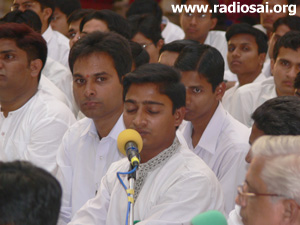 |
|
|
The group singers in action...
|
The solo song...
|
A haunting solo song (the only one for the evening) called "Siva Siva Sankara" declaring that O Siva, You can be owned only by Your devotees, was followed by the final group song of the evening – a lullaby on Sathya Sai ("Sayini Vuyalu Loopandi"):
Let
us cradle the little Sai
Sing a lullaby for the Lord Sai
Let us sing the glory of Sathya Sai
Who is the very form of truth
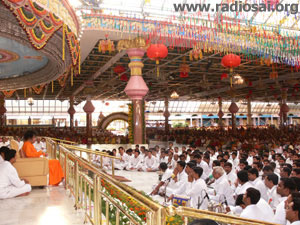 |
 |
|
|
Swami is very happy
|
Swami blesses the composer Sri
Prakash Rao
|
At the conclusion of the set of songs selected for the evening, Swami called up the Music Director and told him that Swami is very happy with the singing, the singing was full of expression. See the atmosphere [in Sai Kulwant Hall] has changed and all the people are happy. That is good, singing with devotion. “Swami likes it. Swami is very happy. Sing tomorrow also”.
The Music Director humbly said, “Swami, it is all Your grace. I am only an instrument”. To this Swami replied, “Yes, you have written with that feeling in your heart. That is why it is so good”.
Swami then released a book in Telugu entitled Salutations in Words to the Universal Lord before arathi was taken at the end of the concert.
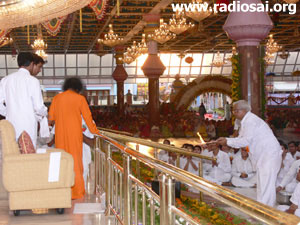 |
The following morning, April 1, Swami graciously permitted the Vishakapatnam Bhajan Group to sing bhajans in the mandir. The entire group was seated in the mandir awaiting Swami’s arrival. Initially they began with the usual bhajans which are sung every morning in His presence. After a short time, however, Swami stopped the bhajans and asked the group leader Sri M.S. Prakash Rao to open his book of lyrics and sing the songs he had composed. They were only too happy to oblige and sang the following selections: |
|
|
Arathi at the conclusion...
|
1. "Idigo Idigo Prashanti Nilayam"
Here this is Prashanti Nilayam, the abode of Siva Sakhthi Swarupa and the
heaven where God walks in human form.
2. "Edesa Megina Ebhasha Palikina"
Whichever country you come from or whichever language you speak, there are
the glories of Sathya Sai, the leelas of Sathya Sai, the miracles of Sathya
Sai.
3. "Andaru Devudu Sairamudu"
Sai Rama is God to everyone. The God of Gods Who protects by giving the
Abhaya Hasta (the blessing of fearlessness by raising the Divine Hand).
4. "Sayee Anu Kamman Pilupe"
The sweet name of Sai makes us remember a loving mother, and the sweet
thoughts of Sai enchant even the mother.
5. "Sayirama Nauka Saagi
Pothunnadi"
The boat of Sai Rama is sailing on. The Sai Krishna boat is cruising along
in which the rudder is Sai and the force that makes the boat move is the
sweet name of the lord.
6. "Parthi Pureesuni Choodaramo
Paramaathmudocchadu Padarammo"
Hail the Lord of Parthi, the Universal Lord has come riding on the palaku
(palanquin), the Lord has come to ward off our sin.
While the bhajans were being performed, Swami got up from His throne and stood close to the singers sitting in the front rows. He asked for the notebook in which the group leader Sri Prakash Rao had written his compositions and asked that songs be sung from that book.
The following conversation took place between Sri Prakash Rao and Swami in Telugu and we reproduce it here as related to Heart2Heart by Sri Prakash Rao:
Swami: Who has written these songs?
Prakash: It is You Swami, it is Your Grace. I am only an instrument. I held the pen and You wrote them.
Swami: You have written with that feeling in your heart and that is why they are so good. Swami liked them. I am happy.
Prakash: Swami, these songs are being sung during the medical camps held in the villages during grama seva.
Swami: I know. That is very good. They inspire people.
Swami then created a navarathna ring (a ring studded with nine gems) and put it on the ring finger of Sri Prakash Rao.
Swami: See these are navarathnas. It correctly fits on your finger. Swami is always correct.
 |
Prakash: Yes, Swami. Swami: When are you leaving? Prakash: Whenever you order, Swami. Swami: These boys are employed. Take Swami’s prasadam in the canteen and then leave. Prakash: Pranams, Swami. Swami: Be happy. |
|
|
The navarathna ring created
for the music composer
|
Swami then allowed everyone in the group to take padnamaskar.
April 7: Ramanavami Celebrations In Sai Kulwant Hall
Ramanavami, or the birth anniversary of Lord Rama, is a major festival celebrated all over India by devout Hindus. Rama, the seventh incarnation of Lord Vishnu, was born on the ninth day after the new moon (hence the term Navami, which means the ninth). He was thus born in the bright half of the Indian month of Chaitra (which normally falls during March and April) in the city of Ayodhya, in the Treta Yuga, the SecondAge.
Ramanavami is a festival which is typically celebrated in Brindavan, for Swami is usually there during the hot months of the year. For the past two years, however, Swami has chosen to remain in Puttaparthi after Sivarathri so the devotees in Puttaparthi had the rare honour this year to pay homage to Lord Sai Rama on the occasion of His birth anniversary.
|
To the surprise and delight of everyone, Swami gave darshan in an open red car – a Cooper that had personalized license plates proclaiming BABA. The devotees for long had been sad they could only have a brief glimpse of Swami during darshan in His Porte, so this open car fulfils a longstanding desire and is an answer to fervent prayers for unhindered darshan of the Divine form. The morning program started off with a veena kutcheri – a veena concert – by the students of the Sai Mirpuri College of Music. The boys obtained Swami’s blessings for the program by praying to Him the previous day with a card they had specially prepared for Him. |
 |
|
|
Swami giving darshan in an
open car
|
 |
They started off with a song in praise of Ganapathi – "Mahaganapathim" in Natai ragam, Eka talam. This was followed by "Sudhamayee" in Amritavarshini ragam, Roopakam talam. This ragam has an important feature in that if one sings this ragam well and with full feeling, it will rain. |
|
|
Obtaining Swami's blessing to
play in front of Him
|
Following this was "Endaro Mahanu Bhuvalu" in Sri ragam and Adi talam. This song is one of the five gems of Sri Thyagaraja Swami. Next came "Paluke Bangaramayeera" in Anandabhairavi ragam and Adi thalam which is a famous song written by Bhaktha Ramadas. "Brahman Okate" in Bhowli ragam, Adi talam, a keertanam by Sri Annamacharya, followed where he states God is one and conveys the advaita bhavam in the song.
 |
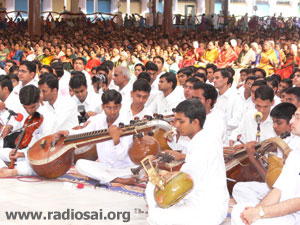 |
|
|
Showing Him the list of songs
on concert day...
|
The concert in progress...
|
The young veena players were K. Bhardwaj, V.N.S. Bhaskar, B.N. Shiva Sai, and M. Gopalakrishna. Violin accompaniment was provided by Krishna Uday while Sudheerkumar and Hari Vijay Ram accompanied them on the mridangam and Mohan Kumar played tabla.
At Swami’s request three carnatic vocal numbers were sung by Sri Jyoteeswaran, lecturer in Vocal Music. "Brovabharama" in Adi talam, Bahudar ragam was the first song (originally written by Sri Thyagaraja) where he wistfully asks Lord Rama, “Is it difficult for You to save me?” This was followed by "Ramanamamu" in Adi talam, Athana ragam, another Thygaraja composition, and the final vocal song, also a keertanam by Thygaraja, called "Nagumomu" in Adi talam, Abheri ragam.
 |
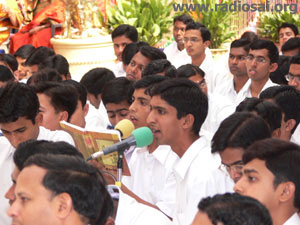 |
|
|
Singing the carnatic vocal
songs...
|
Rama Katha being sung in
Hindi...
|
After this, at Swami’s request, there was a Rama Katha in Hindi sung by Kaustab, Abhijith Sikote and Gopinath Padi. They also sang a favourite Meera bhajan “Payo ji maine rama rathan dhana payo”. They were accompanied by Abhishek on the tabla, Sanket Modi on the harmonium, and Raghavan on the Naal.
|
To round off the program there were songs by the Institute students. Aswath Narayan sang "O Rama Nee Nama" in Adi talam and Om Prasad sang "O Swami" in Adi talam. The final song of the morning was a group effort called "Jagadhabi Ramudhu" in Adi talam. Backing up the vocalists was an assortment of instruments that included two violins, one keyboard, a saxophone, a flute and a tabla. In the afternoon, Swami sat in His chair listening to the vedam for a few minutes and then signaled for the microphones to be set up and requested the Vice-Chancellor and Sri Ajit Poppat to speak. |
|
|
|
Om Prasad sings "O Swami..".
|
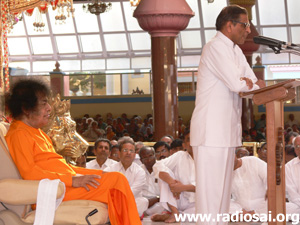 |
Vice-Chancellor Sri A.K. Gokak talked about the noble qualities of Lord Rama and the example He sets for humanity. He said that Rama is the very essence of a noble king and an ideal brother. While Rama represents compassion, Lakshmana represents love and the mixing of the two results in bliss. Talking in depth about the spiritual significance of the Ramayana, the Vice-Chancellor said that the four brothers represented the four human values – Sathya, Dharma, Shanti and Prema. The relationship between Rama and Sita is like that between the Atma and Brahma Gnana – the separation of the two results in delusion as represented by the golden deer. We can cross the ocean of delusion by building a bridge (as done by the monkey hordes in Lanka). The rajasic qualities of Ravana are destroyed and the satthvic qualities of Vibhishana are restored to the throne. Hence the Ramayana has universal appeal and is popular all over the world. In conclusion, he said that on this day of Rama Navami being celebrated before the Living God, let us pray to Him to help us rise above the level of sensuality and climb the ladder of spirituality. |
|
|
The Vice-Chancellor talks
about the spiritual significance of the Ramayana
|
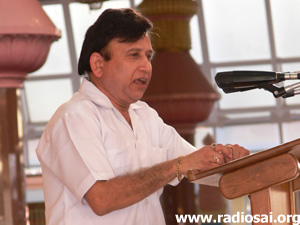 |
Speaking
next was Sri Ajit Poppat, a longtime devotee from the UK. He said that
while the Vice-Chancellor spoke of the spiritual significance of the
Ramayana, he would talk about Sai Ramayana. Starting with the example of
Ahalya, he said that while Ahalya was transformed by a simple touch, Swami
transforms by a mere look. Stating that he has been coming since 1989, Sri
Ajit Poppat drew from his vast experience and talks with Swami to drive
home to the crowd some of Swami’s important teachings. Drawing another
parallel, he said that while Lord Rama used the monkeys to build the
bridge to Lanka, Sai Rama stills the monkey mind and makes it pure and
calm. The bridge we must build today is one of confidence, courage and
conviction. He said we must translate Baba’s message into action.
Transform yourself first, he exhorted the crowd, then put Swami’s message
into action without a sense of doership, and whatever you say, you must
do.
|
|
|
Sri Ajit Poppat addresses the
crowd
|
After Sri Ajit Poppat’s speech, to everyone’s delight Swami signaled that the table be brought so He could deliver His Divine Ramanavami discourse. Swami said:
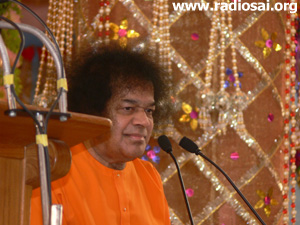 |
|
|
|
The Divine Discourse
|
Lord Rama is an example of this. On the contrary, Manas Anyat, Vachas Anyat, Karman Anyat Duraatmanam. Ravana is an example of the latter. Rama stands for Satya and Ravana for Asatya.
Today, man is faced with a number of problems because of speaking untruth. Once we speak untruth, we lose the quality of life. Truth is ever lasting. It is changeless. Students, you all must observe Truth from this age onwards so that you will become ideal citizens tomorrow. Offer all your actions to God and it will get transformed into Truth.
All innermost feelings are reflections of Truth. However, when they manifest through the tongue and other senses they become false. Therefore, senses are responsible for merit and demerit. Truth shows the direction, Dharma follows it and Prema experiences and tastes it. Once you taste this Love, you will never be able to cause Himsa (violence) to anybody. Himsa is not just hurting others. Not following one's given word is also violence - Himsa.
Mind is clouded by desires, just as the moon is covered with dark clouds. But do not feel sad. The moment the dark clouds clear away, the moon is seen. We must do Naamasmarana to blow away the clouds of desires covering our minds…Tell me your company and I shall tell you what you are. Never be in bad company. Always be in good company. Yad Bhavam Tad Bhavati. Many of us question as to why God cannot transform us. God never does anything. Your thought and action itself does everything and gives you feedback. If you eat a mango fruit you will invariably get only the belch of a mango fruit. You cannot get the belch of a neem fruit, having eaten a mango fruit.
One who thinks constantly can never be happy. We must transcend our thoughts. Bookish knowledge leads to allergy and all our energy is lost. At a higher level, one need not think, Is it good or bad? Everything is good only. Whatever happens is for our good only. Live with this conviction.
Love all, never hate anybody. Some doubt God also. That is the greatest sin. When such bad thoughts come, consider them as enemies and brush them aside. Love will protect and nourish you. Live in love. You all are Embodiments of Love…
What we need today is not expansion of the physical heart, but transformation of the spiritual heart. Be in search of the path that can accommodate as many people as possible.
Then addressing students He said:
Tomorrow all of you will be leaving for your hometowns. Keep all that you have learnt here in your mind. Never make your parents feel sorry. Make them happy. If you are happy they too will be happy. This is your duty. Khana, Pina, Sona and Marna will automatically happen. The main purpose of our being born is to make our parents happy. Be good ideals. Then alone will you gain the fulfillment of being students of the Sri Sathya Sai Educational Institutions.”
Thus concluded another memorable Ramanavami, this time held in Sai Kulwant Hall. The whole ashram was now abuzz with the word that Swami will shortly leave for His playground, Kodaikanal.
Bhagavan Leaves for Kodaikanal
On April 9, with an entourage of 60 students, staff and guests, Swami left Parthi for Kodaikanal on a chartered flight to Madurai, where He blessed many hundreds of devotees. He then traveled by road to the elevated cooler climes of the hill resort of Kodaikanal.
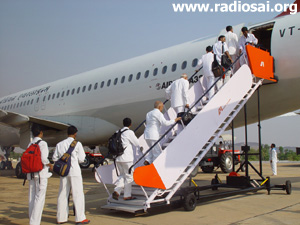 |
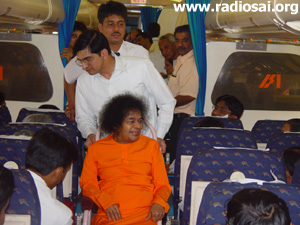 |
|
|
The Kodai troupe members
boarding the plane
|
Swami inside the plane
|
source: http://media.radiosai.org/Journals/Vol_04/01MAY06/prashanthi-diary.htm